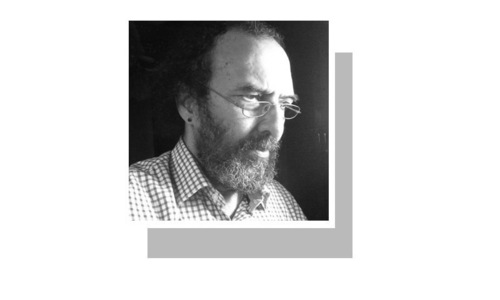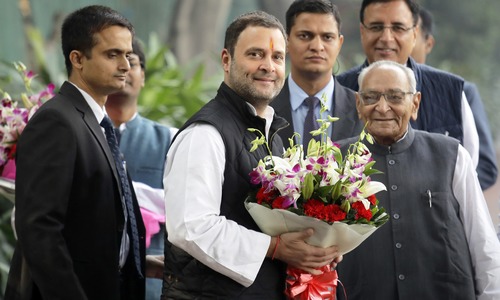NEW DELHI: He has never held public office, once likened power to “poison”, and saw his politician father and grandmother assassinated. Now Rahul Gandhi is set to take over as leader of the party that has ruled India for much of its history.
The 47-year-old’s nomination as president of the Congress party follows years of speculation that he would succeed his mother in the role he has been prepared for since birth.
On Monday, party workers cheered as senior Congress leader Mullappally Ramachandran announced that Rahul, who stood for election unopposed, would be the next president of the party his family has led for generations.
“I hereby declare Shri Rahul Gandhi elected as the President of the Indian National Congress,” he told reporters, calling it “a historic occasion”.
He will officially take over as Congress president on Saturday at a ceremony in New Delhi.
The son, grandson and great-grandson of prime ministers, Rahul has carried the burden of expectation since his father Rajiv Gandhi was assassinated in 1991.
His reputation as a reluctant leader and his lacklustre performance in the 2014 general election campaign, which he fronted, had cast doubt over his suitability for the role.
But analysts say the Gandhi family’s tight grip on the party leadership — dating back to India’s first prime minister Jawaharlal Nehru — made his ascension almost inevitable.
His mother Sonia has led the party for 19 years and has worked tirelessly to ensure her son’s eventual succession.
But he faces an immense battle to revive the ailing centre-left party ahead of the next national elections due in 2019.
A Financial Times editorial last month called Rahul an “amiable and pleasant fellow who lacks the will to win power or the killer instinct necessary for the cut and thrust of political battle in India”.
Just 58 per cent of Indians view him positively, according to a survey conducted by the Pew Research Center earlier this year that put Prime Minister Narendra Modi 30 points ahead of him in the popularity stakes.

Life of privilege
“He will be always seen as a dynast. But much will depend on how he delivers results for the party,” said Gurpreet Mahajan, political studies professor at Jawaharlal Nehru University in New Delhi. “His only shield to criticism will be performance.”
Rahul’s supporters argue that he has landed some punches in recent months after a lengthy post-election period during which Modi’s ruling Bharatiya Janata Party (BJP) appeared unassailable.
Others, however, say a dip in the BJP’s popularity has has more to do with a slowing in growth under Modi, the son of a tea-seller who has repeatedly riled Rahul as a shehzada or prince.
Rahul was born into a life of privilege, but his younger years were cloaked in tragedy.
He was 14 when his grandmother, Prime Minister Indira Gandhi, was slain by her Sikh bodyguards in 1984 as revenge for the storming of the Golden Temple in Amritsar.
Just six years later, his father Rajiv was killed by a suicide bomber when campaigning for re-election.
“In my life I have seen my grandmother die, I have seen my father die, I have seen my grandmother go to jail and I have actually been through a tremendous amount of pain as a child,” he once said in a TV interview. “When these things happen to you, what I had to be scared of I lost. There is absolutely nothing I am scared of.”
Rahul was educated in India and at Harvard and Cambridge, and first worked in business management in London before winning the family constituency seat of Amethi in Uttar Pradesh state in 2004.
After a stint as head of its youth wing, his profile rose further when he became Congress vice president in January 2013.
But he has struggled to carve out a reputation as a politician in his own right, not helped by the fact his younger sister Priyanka brims with the charisma he is accused of lacking.
He rejected offers to enter the last Congress government, instead promoting causes such as right-to-information legislation he regards as key to curbing rampant corruption and a food security bill that critics say India can ill afford.

He has been at his most impassioned defending the secular tradition personified by his great-grandfather Jawaharal Nehru, India’s first prime minister, whose socialist model framed the post-independence economy.
Rahul faces his first test as Congress leader in elections in Gujarat, Modi’s home state, which the BJP has ruled for over two decades.
He has led the Congress campaign for the election, winning the backing of some influential caste groups who say they have been left behind by an economic boom in the prosperous western state, although Modi remains the man to beat.
“Everyone is waiting to see what he can do for the fortunes of the Congress,” Delhi-based political analyst Manisha Priyam said.
Published in Dawn, December 12th, 2017














































